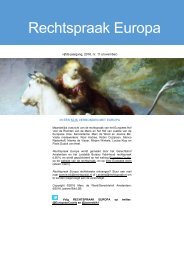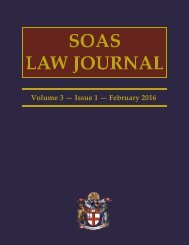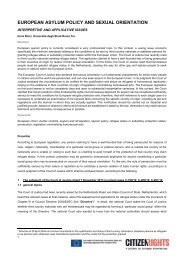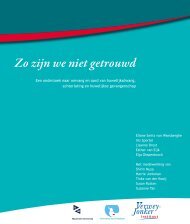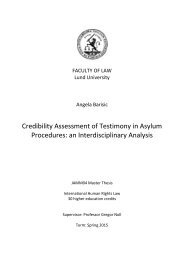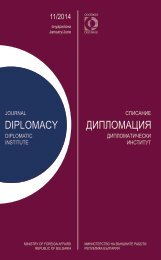AEMI
AEMI-2016-web
AEMI-2016-web
You also want an ePaper? Increase the reach of your titles
YUMPU automatically turns print PDFs into web optimized ePapers that Google loves.
SOLANGE MASLOWSKI<br />
167<br />
his/her age, state of health, family and<br />
economic situations, social and cultural<br />
integration and the extent of his/her link<br />
with the country of origin. The more integrated<br />
the Union citizen is in the host<br />
Member state, the higher protection<br />
against expulsion he will receive. Just<br />
a few legal grounds for expulsion can<br />
be used against a long-term, integrated<br />
mobile Union citizen. Indeed only serious<br />
grounds of public policy 24 might be<br />
used against Union citizens who have the<br />
right of permanent residence and only<br />
imperative grounds of public security 25<br />
may be used against Union citizens who<br />
have resided in the host Member state<br />
for the previous ten years. Similarly, minors<br />
are especially protected against expulsion,<br />
which is only possible if based<br />
on imperative grounds of public security<br />
or if necessary for the best interests<br />
of the child according to the United Nations<br />
Convention on the Rights of the<br />
Child of 20 November 1989.<br />
Moreover, mobile Union citizens are<br />
also protected by the proportionality<br />
principle (Article 27-2), which plays a<br />
significant role for economically inactive<br />
Union citizens because it frames the<br />
intended distinction between a “reasonable”<br />
and “unreasonable” burden 26 , the<br />
latter leading to an expulsion. Likewise,<br />
prohibiting a Member state from basing<br />
an expulsion order on purely economic<br />
ends should prevent economically inactive<br />
Union citizens from being expelled<br />
only on the ground of not being self-sufficient.<br />
Article 30 of Directive 2004/38/EC<br />
requires the notification in writing of<br />
expulsions orders, which clearly and<br />
fully states the content and the implications<br />
of such decisions as well as the details<br />
for appeal. Article 31 on procedural<br />
safeguards guarantees to mobile Union<br />
citizens the right to judicial or administrative<br />
redress.<br />
Besides these general safeguards available<br />
for all mobile Union citizens, the<br />
Citizenship Directive also regulates the<br />
particular protection of certain categories<br />
of economically inactive Union citizens.<br />
Two main categories of persons are<br />
supposed to be protected, despite some<br />
Member States specifically targeting<br />
them with expulsion orders:<br />
- Those who have recourse to social<br />
assistance are protected against automatic<br />
expulsion orders (article 14-3).<br />
- Those who have entered the<br />
territory of the host Member state to<br />
seek employment. They should not be<br />
expelled as long as they can provide evidence<br />
that they are continuing to seek<br />
employment and that they have a genuine<br />
chance to be engaged (article 14-<br />
4b).<br />
This protection is nevertheless insufficient<br />
because of certain Member States’<br />
abuse of their expulsion powers. For this<br />
reason, some important steps should be<br />
undertaken to better protect economically<br />
inactive mobile Union citizens.<br />
The first step should obviously be a better<br />
definition of legal grounds leading<br />
to expulsion, the second step being the<br />
exceptionality of the use of the expulsion<br />
sanction, and the last step being a<br />
European-level approach to the rights of<br />
movement and residence of economically<br />
inactive Union citizens.<br />
B. Challenges<br />
Economically inactive Union citizens<br />
are not protected enough against expulsion,<br />
despite the existing safeguards.



